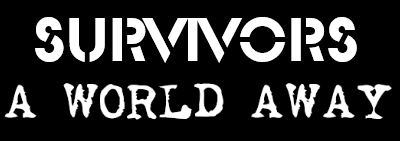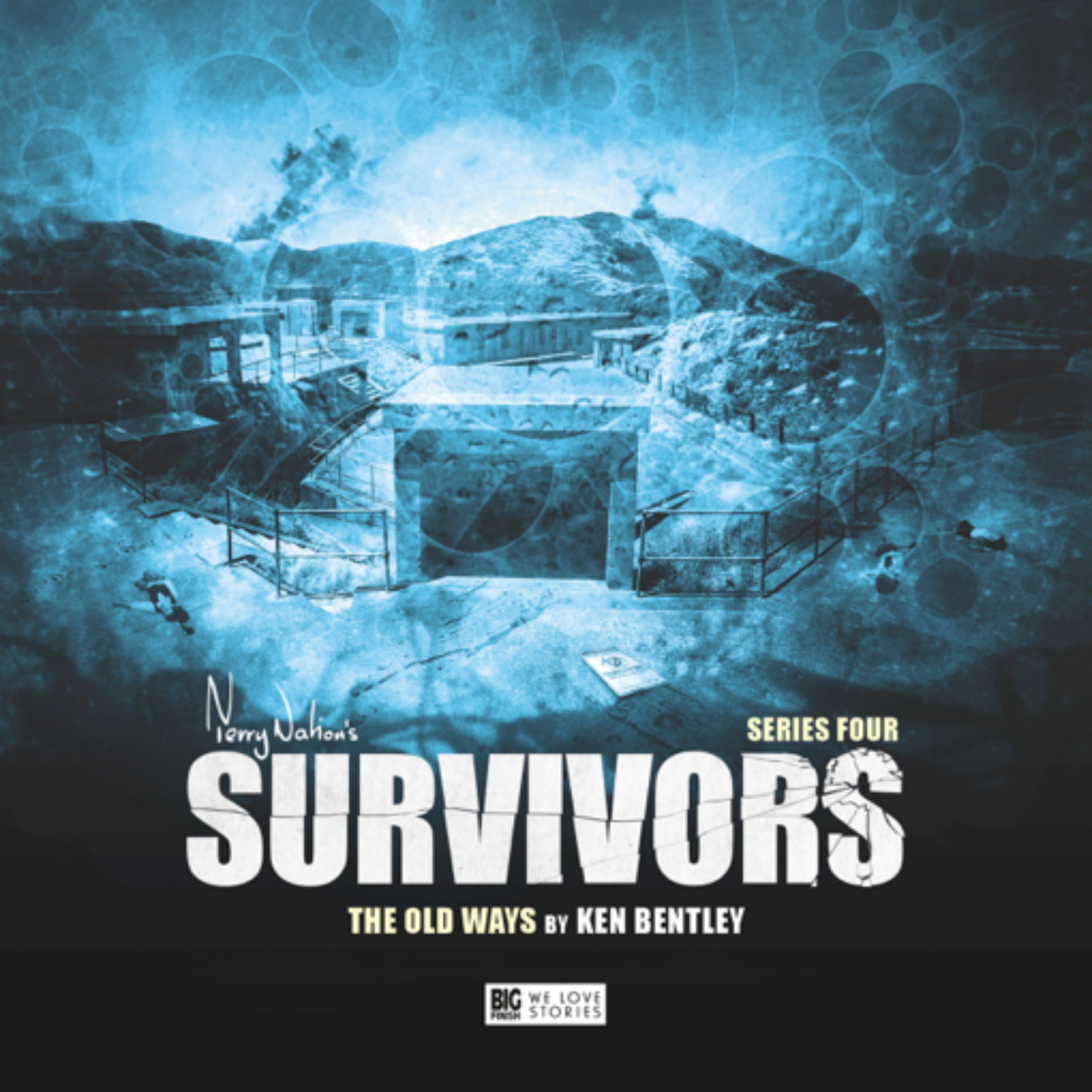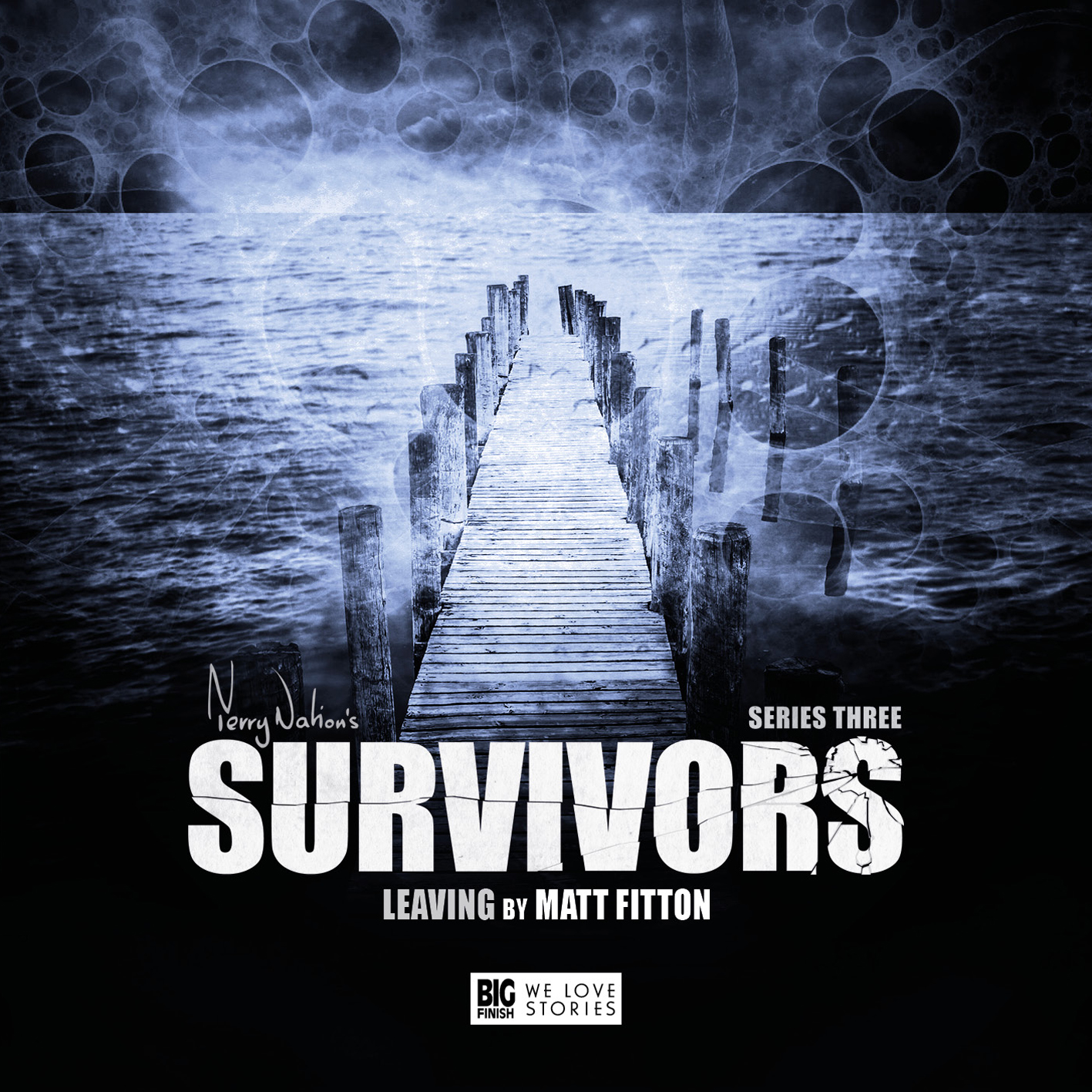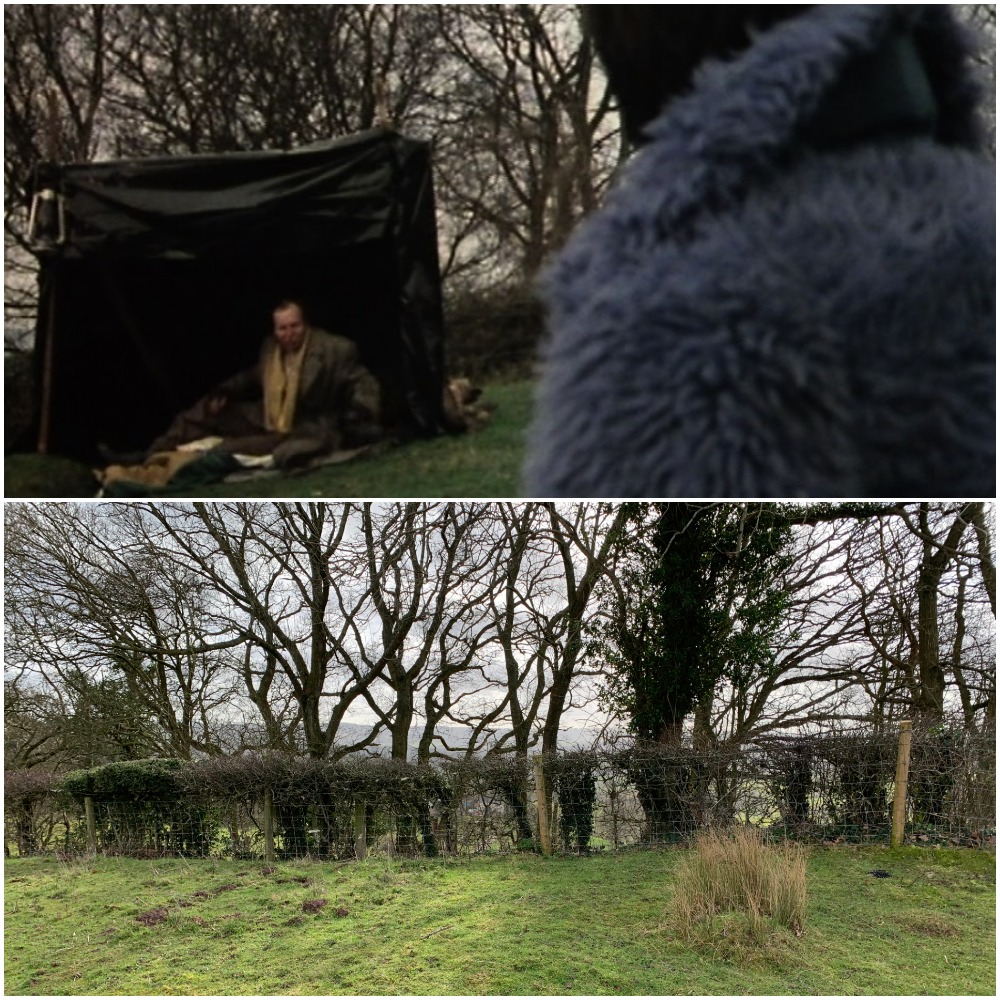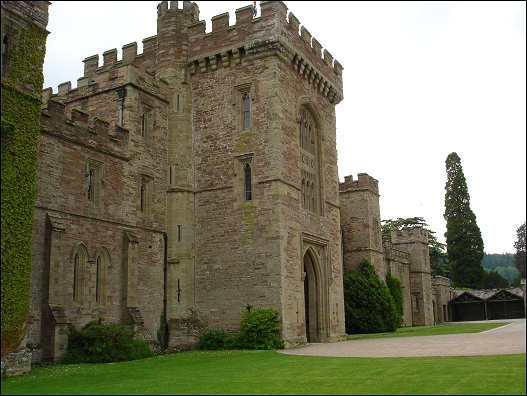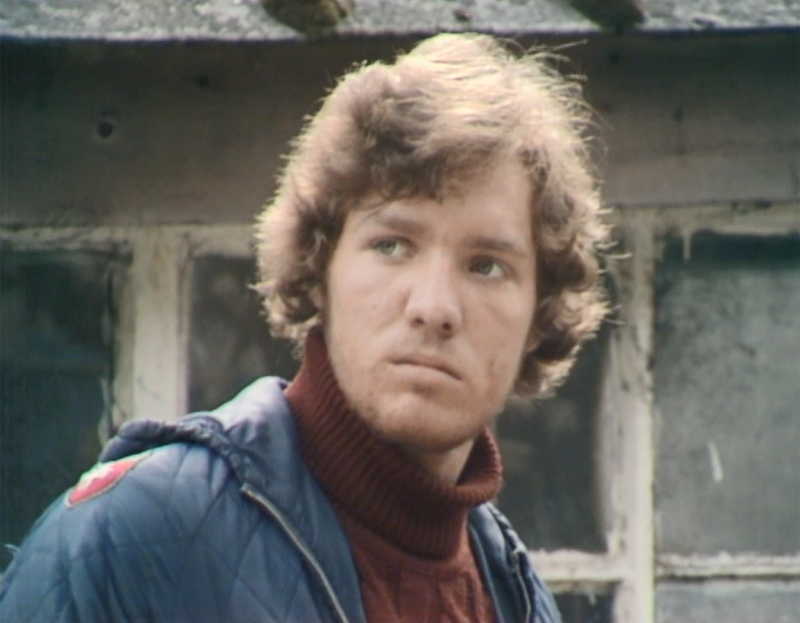
ROGER MONK JOINED the cast of Survivors in the spring of 1976, to appear in the closing three episodes of series two.
As a member of the ensemble of new young characters who settle at Whitecross in the events of New Arrivals, Roger took on the role of the bobble-hat-wearing, guitar-playing Pete, joining in the games and celebrations of Over the Hills and observing the break-up of the Whitecross community as the revelations of New World reverberate throughout the settlement.
He recalls: "I was sixteen and I'd worked as an actor since the age of twelve, but this was the first time I'd worked without a chaperone and away from London. It was only for a month but seemed to be much, much longer."
"My first TV appearance was at the age of thirteen, in a BBC historical drama called The Dragon's Opponent." Made in 1973. Written by Colin Morris, who had worked on Z-Cars as both a scriptwriter and a producer, it had starred Ronald Pickup and Virginia McKenna, and had told, in four fifty-minute episodes, the story of the Earl of Suffolk's work as a bomb disposal officer in World War II. The Dragon's Opponent was directed by Gerald Blake who would go on to work on the first series of Survivors.
No-one would have ever believed that I was taking time off from school to be there
Roger Monk
"Peter Duncan was also in it. He played my older brother - and had the job of shooting me in the foot. The wonderfully Welsh Pennant Roberts was the assistant director."
"It's almost hard to remember now, but back in those dim and distant days there was really no such job as a casting director at the BBC. So it was foot-in-the-door casting. Work on one programme could lead to you being hired for another. For all I know, I might have been the only other young actor Pennant had worked with."
"As I heard it, three years after The Dragon's Opponent Pennant cast Peter for Survivors and thought of me as a kind of 'package', I suppose. I was flattered that he'd only later bothered to check if I could play the guitar or not."
Younger even than most of his contemporaries in the New Arrivals intake, Roger had to secure the agreement of his school to take part in the programme. "I looked a lot older than my sixteen-years, and I suppose my manner was a little bit more mature too. Certainly, no one would have ever believed that I was taking time off from school to be there. My fellow young actors were all youthful in appearance, but were in their early twenties. This made them wise and experienced beyond all measure in my eyes, professionally and personally, and my conversations with them gave me the heads-up about what was heading my way in the next few years."
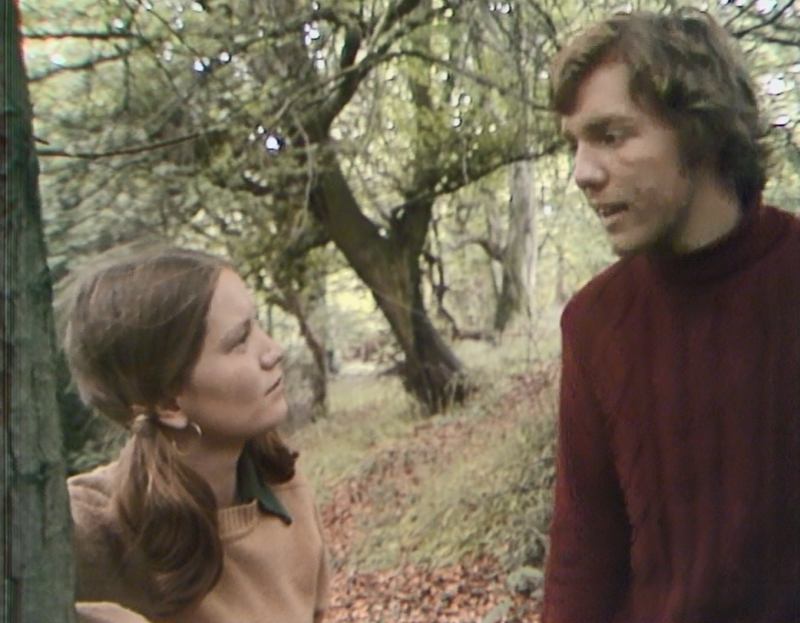
Roger struck up some instant friendships with fellow cast members. Peter Duncan, who played the role of Dave, recalled in an interview with Survivors: A World Away in 2003, that Roger "was quite melancholy. He used to sing lots of Simon and Garfunkel quite a lot. Emily, Wherever I May Find Her, I seem to remember him singing rather a lot, in that nice cottage." Roger concedes that: "I'm sure there's truth in this. But, hey, I was only sixteen, and I would like that fact to be taken into consideration when charges like being morose, miserable, world-weary, and a pain in the backside are being laid - and then I'd like 'he who is innocent to cast the first stone'! As for my guitar playing and singing, I still like Paul Simon though."
I was apprehensive at first, but... everyone was very welcoming to us
Roger Monk
Roger was not given a detailed introduction to the post-apocalyptic setting for the show, or a run-through of the events that had preceded his and his fellow new cast members' arrival. "Nah, it didn't really work like that. I'm sure that back when series one was starting out there were discussions between writers, directors and leading actors, but by the time we turned up everyone knew the format, so it was more by way of 'get the script in the post, learn the lines, be ready to hit your marks on day one'."
Joining the production on location in the spring 1976, Roger readily concedes that he was a little nervous as he prepared for his first scenes in front of the camera on 12 May. "I'm sure I was apprehensive at first, but I can only say that everyone - cast and crew - was very welcoming to us. Within days I felt as though I'd been there for ages." Amongst his co-stars he "was a little in awe of Stephen Tate. I was a big Jesus Christ Superstar fan back in my youth and Stephen's recent performance as Judas had been fantastic." Co-starring alongside Paul Nicholas (in the role of Jesus), Stephen Tate had won rave reviews for his performance as Judas when the show premiered at the Palace Theatre in London in 1972. "But I don't recall being daunted by the prospect of joining a successful show. Joining an unsuccessful show; that's daunting."
Roger is, however, very clear in his own mind that Survivors should not be thought of as a 'sci-fi' show. "Survivors is a drama serial, I believe. Science fiction is the shiny stuff with space ships and aliens, right?"
Unlike some other actors who worked on series two, Roger did not find himself drawn into the 'real-life' community at Callow Hill although he did relish the time he got to spend in the setting.
"I really don't remember having any contact with the community who lived at Callow Hill, but as a place to work it was a dream. How big a set do you want? And, best of all, during all that time when you weren't working you could take yourself off for a walk in the amazing countryside that surrounded the place." Rather than trying to find 'digs' at Callow Hill itself, or accepting a hotel room in nearby Monmouth, Roger - together with Peter, June and Heather - found a cottage to rent together close-by. "The cottage had a mile-long drive, a swimming pool, a barn with a table tennis table in it (which was my game back in the day), and we cut our own wood for a fire. Guess how much it cost? £20 pounds a week, or a fiver each. It was about four miles outside of Monmouth, which in turn was some way from the locations and various places we'd meet of an evening. I was too young to drive so mostly I tootled around with Heather in her state-of-the-art car, a Morgan V8 Sports."
Idyllic is what it was. Though I don't remember this occurring to me at the time
Roger Monk
Many might consider that, as acting jobs go, Roger's experiences on Survivors sound fairly idyllic - particularly for a young and relatively inexperienced sixteen year-old actor. Is that an overly-romantic picture of a much more tougher reality? Not at all, Roger concedes: "There I was, a sixteen-year-old away from any adult authority for the first time in my life, working on one of the country's most popular TV programmes in the lovely countryside of Monmouthshire in the wonderful weather of the spring and summer of 1976, being driven around in a new sports car by a beautiful woman and living in the house of your dreams. So no, I don't think the picture you paint is too romantic. Idyllic is what it was. Though I don't remember this occurring to me at the time, I now see that this is a classic case of life imitating art. As the young people in the series had set-up 'Carter's Commune' in the mill, so in real life did we young actors set up a place of our own."
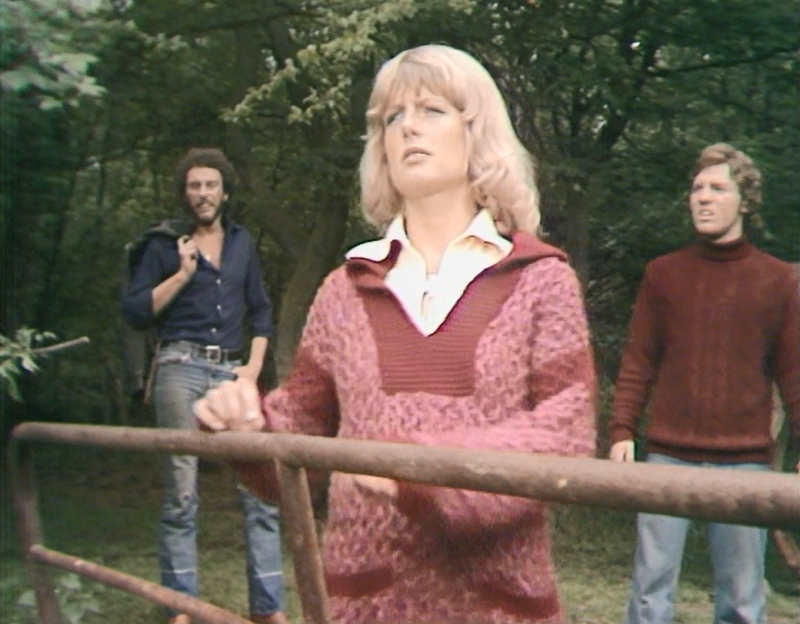
Many of the behind-the-camera crew on Survivors frequently recall the acute time pressures which could make the production so demanding a process. For Roger, like other series two actors, the experience was different. "It's funny. I suppose it depends who you ask. I'm sure the production team remember it as a challenge to get each programme made in the time and if there are actors who remember it as pressurised then I don't doubt their word, but I have to say that I'm with Peter all the way on this one." In his 2003 interview, Peter Duncan recalled that there: "wasn't a lot of pressure on getting us to do too much, really." In fact, for Roger: "Thirty years later I'm still working in TV and film and I've never been as relaxed as on Survivors."
Clear evidence of the informality of the production process on Survivors, as Roger experienced it, comes from his final contribution to Over the Hills. "I only remembered this on seeing it again on the DVD: A scene was being recorded out in the fields and, as I was hanging around and not doing anything else, I asked if I could be in it. I was told that my contract for this episode had expired the day before so I couldn't. So I asked if I could be in it if I did it for free. They said I could. So I did. The scene has two actors in the foreground delivering dialogue while I, on a cart in the background, instigated a hay fight with the other actors to the sound of much hooting and hollering. It was merciless upstaging and great fun. That's how rigorous it wasn't."
Roger also enjoyed the experience of working with the Outside Broadcast (OB) cameras used on the programme. "It had its drawbacks, like its famous blindness to even the heaviest of rain, which made it look as though the director had had a bucket of water thrown over you two seconds before shouting 'action'" - something very evident in the sequence in New World in which Pete joins Greg and others in attempting to lower the body of a mystery pilot from his rigging of his crashed hot-aired balloon. "However, I did find it a very good way to work. Film has a far better quality, but it's a very slow process. First, the director shoot a 'master' of the scene, then adds-in however many close-ups are needed, each involving moving the camera, changes of lighting and so on. With OB you could often get the whole scene in one go instead of snippet by snippet. Much quicker and much better for performances. So, though ten days isn't all that long to make fifty minutes of TV, with OB it was do-able."
With OB you could often get the whole scene in one go instead of snippet by snippet
Roger Monk
"My abiding memory of arriving was that us young 'uns had to go to make up and costume to get our appearance right before we began work. Heather Wright (who played the role of Melanie), June Page (Sally) and Peter went first and returned to us looking shell-shocked at their respective makeovers. That hair! Those clothes! Mustering my courage, I headed into the valley of death to endure the same humiliation. They took one look at me and said: 'Yeah, you'll be fine as is'."
"So that hair was just the way I had it in those days and the clothes, I'm ashamed to say, were mostly my own - including that stupid bobble hat. Now, it's true that this was the mid-1970s, the absolute nadir of teenage fashion, but realising that your appearance can be thought of as suitably post-apocalyptic makes you think, I can tell you. It makes you think."
When it came to preparing for his performance, Roger did not enjoy the luxury of the rehearsal days at the 'Action Hilton' that the programme had relied on the previous year. What little rehearsal there was took place on site, in whatever time could be spared - often this consisted only of a walk around the site.
"I have only one memory of rehearsing on Survivors, and it's an illuminating one even if a little bizarre. One of the directors took a group of us actors on a tour around the farm and indicated various locations. He pointed at a field and said: 'That's where we'll do that scene'. Then we walked to the gate of another field and he said: 'That's where we'll do that scene'. And so on it went, and that was it - the full extent of our 'rehearsal'!"
The powerful dramatic themes of the three episodes he appeared him appealed to Roger and his young colleagues at the time. "I'm sure we all felt that the programme had a very strong premise, though. And, at the risk of sounding like a Grumpy Old Man, I'd welcome themes as strong as the ones you cite for the three episodes I was in onto current prime time TV with open arms."
"I'm sure you'll have heard this many times, but the handing out of the next script was always a bit of a worrying time for the actors on Survivors. On most programmes it's no big deal, just something to be looked at when you get to it. But on Survivors you could be written out without warning. This meant you'd be heading home within a few days; losing income you'd be banking on and, in all probability; going back to being unemployed. So scripts were scanned a little anxiously to see if you were still in it on the last page. Let's put it this way, if your character was feeling a little poorly on page ten then it was probably a good time to give your agent a call."
That hair was just the way I had it in those days and the clothes, I'm ashamed to say, were mostly my own
Roger Monk
Roger has many strong memories from his work on Over the Hills. "The party scene has stuck in my memory because its atmosphere of a lovely outdoor party in the sunshine wasn't in the least acted. It just was a lovely outdoor party in the sunshine. Those who had dialogue had a bit of work to do, but the rest of us could just concentrate on enjoying ourselves. And it really comes over, doesn't it?"
The singalong at the party's end gave Roger the opportunity to play acoustic guitar alongside Ian McCulloch, one of the programme's leading actors. "I'm tempted to point out that the party scene gave Ian McCulloch a chance to play the guitar with me, but we'll move on. In passing, almost all the actors at that time played the guitar, many of them better than I, the supposed 'guitarist'. Ian and Peter were among those who wrote their own songs and very good they were too."
The scenes in the mill in Over the Hills which involve the rope game, Roger concedes, do appear quite dangerous on screen. "They do look dangerous, don't they? I can only say that I can't remember any real danger and I'm sure the BBC wouldn't have made something genuinely dangerous. I do remember that June Page had lied through her teeth at the casting, claiming to be an expert rope climber. Directors must hate actors for this, we'll lie about whatever we have to lie about to get the job and figure what to do if and when we get there."
By contrast, Roger was confident that his cycling skills were more than adequate to provide the power for the impromptu 'disco' in the mill. "Powering a dynamo was no big deal for a young man; hungrily eating a stew that was hot when you rehearsed a scene but was stone cold and filmy by the time you finished shooting it was."
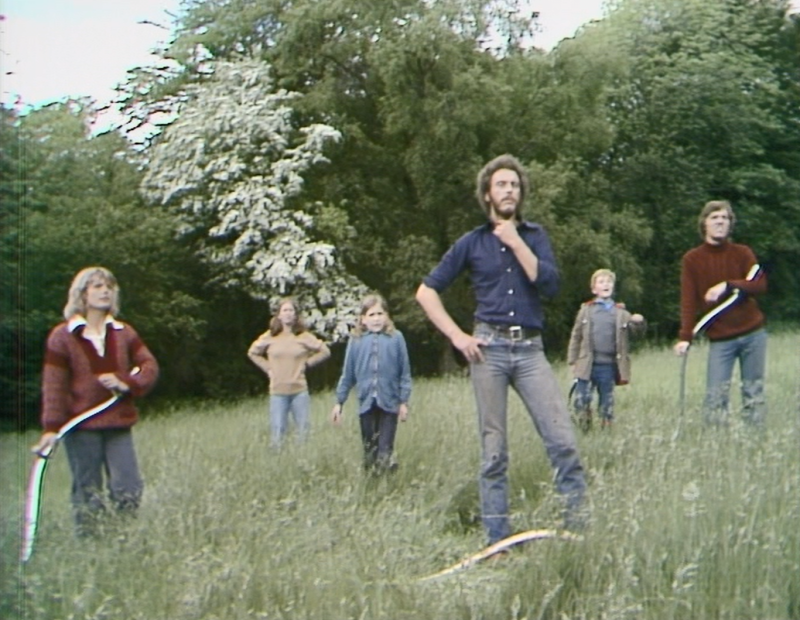
Some of the outdoor sequences close to the mill had to be recorded in front of a sizeable live audience. "There's a large empty field by the mill. At least, it was empty until the bank holiday weekend and suddenly it was full. A huge crowd gathered to watch us walking in and out of the mill. I've never ceased to amaze at the way people will stand for hours and watch the most mundane of human activities just because a camera is involved."
"I'd have to say from a purely selfish point of view that the third episode New World was my favourite, just because it turned out - unexpectedly - that I was in it! I'd only been booked to do two, and my role in the second was a non-speaking one, so I didn't know if I was in the third episode at all until the scripts were handed out. I was delighted to find I was staying till the end - and touched that others were glad, too." The closing sequences in New World in which Greg, Jack and Agnes prepare to leave Whitecross to begin the long journey to Norway were memorable ones to record. "I'd never seen a hot-air balloon up close before and hadn't realised how enormous they are." However, Roger remembers that, as the reaction of the assembled farewell party to the launch of the balloon was recorded he realised that: "no-one gave those of us watching the balloon leave an eye-line to focus on. So if there are twenty people supposedly watching the balloon take off are all looking up at slightly different points in the sky."
After work on New World concluded on 4 June 1976, the production held a party to celebrate. "Was the wrap party the one in a barn? There were rather a lot of parties. And pubs. And drinking (though not me, of course. I was too young.) And not much sleep. I do clearly remember the goodbyes, though. Truthfully, I cried and I wasn't alone in this. I'm sure I wasn't alone in feeling that I'd been a part of something special."
Roger would certainly have been interested in returning to Survivors for the third series had the opportunity been offered. "I think it was hope and not expectation that we would be in series three. After all, one series tends to pick up where the previous one left off, right? And it was clear that us young 'uns had been a shot in the arm for the programme. But, on the other hand, it was Survivors. Time passed and no word came until it became clear that the third series was being made and we weren't in it. And, of course, this was tough as I wanted to go back and play some more and because we'd only scraped the surface of our various characters' potential."
"June, Peter and I spent a good part of that long, hot summer of 1976 together. But actors are actors and must move on. Peter, of course, made a big career change by going to Blue Peter. That really surprised people at the time, but it was probably a shrewd move. I read in the paper the other day that now, many year's later, he's the UK scouting movement's Chief Scout."
I do clearly remember the goodbyes... Truthfully, I cried and I wasn't alone in this
Roger Monk
"I did watch some of the third series, but I have to say that I don't have clear memories of it from the time. I respect the thinking that the series had to get away from Whitecross. I suppose there was a danger that a programme that had started as 'The End Of The World As We Know It' could become a drama set on a farm, sort of like The Archers with a twist. But it seemed that Ian's decision to leave the programme had taken the whole thing off on a tangent and it had lost its direction."
Roger's memories of his time on the show continue to extend beyond the mechanics of the shoot itself. "The work was great, but for me that was only the half of it. The other half was the social life (the good company, and the laughter) and, for me, the crash course of learning about both acting and life. The memories remind me of that famous A E Housman poem A Shropshire Lad: 'That is the land of lost content, I see it shining plain; The happy highways where I went, And cannot come again' - those 'blue remembered hills'."
Asking Roger if he had taken any of his own photographs during his time at Callow Hill elicited some intriguing reflections on how the ideas of recording life-history have changed over the last three decades.
"I'm afraid I don't have any photos from my time on the programme. Not that that will surprise you greatly, I guess. Looking at The End of the World? one could be forgiven for thinking that Denis Lill was the only person who could afford a camera, but that wasn't the case and your question set me to wondering why I don't have any pictures from the time."
Getting reacquainted with the programme following the release of series two on DVD in 2005 was, for Roger, something of an odd experience. "It's a strange, strange thing to see your sixteen-year-old self again. I'm this kind of gawky boy-man-thing. All that hair! Those clothes were mine! That bloody bobble hat! It was good to see it all again. Looking back in retrospect, some parts of the programmes are, let's be honest, quite poor; while other elements stand up very well."
The interviews with Denis Lill, Lorna Lewis, Pennant Roberts and Heather Wright on the 'special features' of the DVD provided an opportunity to catch up, as a viewer, with fellow Survivors alumni: "It was a real surprise to see Heather looking so remarkably unchanged; not to mention finding that Lorna now sports a dog-collar. If anything, Pennant's Welsh accent sounded even richer and more lyrical than it had done back in 1976."
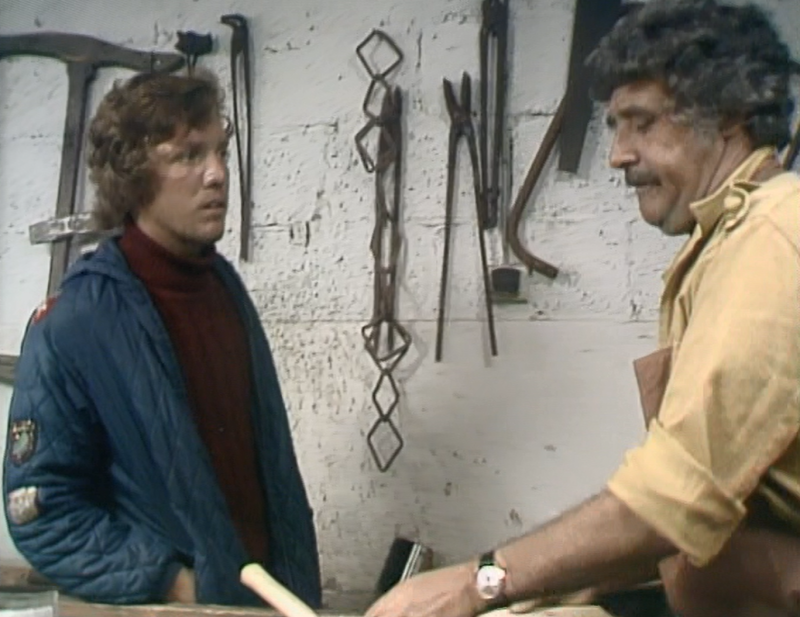
"And I think that lack of photos tells us two things. Firstly, it suggests how much we've changed as a society in the intervening thirty years. With digital cameras, camcorders and so on, we record a lot more than we used to. For instance, I have a precious few photos from my childhood; but my children will have volumes to look back on later in life. But the fact that I did not take any photos during my time on Survivors also says something about the job. I had a camera, why didn't I take it? Why did so few of us, it seems? I can only think the answer is the difference between the expectation and the experience. I must of thought I was going to do 'just another job' and had no idea that it was going to be important to me.
These days every TV production unit comes with a photographer who takes countless shots of everything, but all I remember from back then was that someone (it might have been one of the coach drivers) took one photo of we four young people together (Heather, June, Peter and myself) and told us he's get us all a copy. Unfortunately, he never did, so I never saw it: one of life's little sadnessses."
The fact that I did not take any photos during my time on Survivors also says something about the job
Roger Monk
"The other thing, of course - and I'm certain everyone says this to you, but it can't be over-emphasised - is that we had no idea that the series would have such longevity. Survivors never had a repeat run on the BBC and the home video recorder was still a few years away at the time it was broadcast, let alone the technologies of multi-channel digital television and DVD boxsets."
"The most that a programme had by way of an afterlife was when you got a few quid (literally, in my case) from the programme being sold overseas. So we were making a programme that was destined for a single one-off transmission, of a Wednesday evening, and that would be it. If anyone had told us that thirty years on people would still be watching us, that there would be a commercially published book about it all, I think we'd have been completely gobsmacked."
"It's interesting to consider whether the knowledge that the show would still be being watched and scrutinised more than thirty years after we made it would have made any difference to our approach to the work. Perhaps we'd have taken it all a little more seriously and had less of a smile in our hearts, and this would have been a loss, I feel."
"I didn't play a big part in Survivors, but it played quite a big part in my life. It was a huge learning experience for me, and one of the happiest months of my life. It was an important rite of passage, and I think this is why my memories of the time are so clear."
Roger Monk was interviewed by Rich Cross in January 2007
Cite this web page
Cross, R. (2021). 'Interview: Roger Monk,' [online] Survivors: A World Away, 31 January. Available at: https://www.survivors-mad-dog.org.uk/a-world-away/Interview_Roger_Monk.php. Accessed on: 26 February 2026.
Current style: Harvard
TAGS
